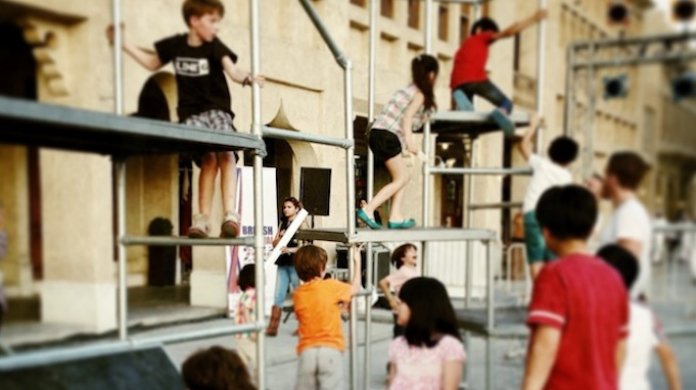The ripple effect
Kuwait and Qatar came about because Paul Doubleday [Director of the British Council in Oman] recommended us. There’s a challenge in going out to the Middle East with the kind of work we do, because it sits in quite an interesting place between different art forms, between contemporary dance, sport and art. We work with Parkour, which is often seen as a sport, and we work in non-conventional places. We work in the hinterlands and border places. We work with young people who are disadvantaged, and with audiences who would not normally go to see dance.
The appeal of the Middle East is very much there’s an immediate relevance and appeal to audiences. Where we can accompany our work with workshops that encourage young people to be creative, to think creatively, to move creatively, then obviously that has a big resonance. The people in the region who are already working with young people, doing outreach work, trying to get young people moving and being creative, they see how useful our work can be. That’s important to us, trying to be useful.
"there’s an immediate relevance and appeal to audiences"
One of the things that attracted us to working with Parkour in the first place is its deliberate primitivism – the essential movement vocabulary is very primitive, it’s running, climbing, jumping, sliding, rolling, the kind of stuff that everybody has in them from birth. It’s the kind of movement people do when they’re growing up, learning about their bodies. For example, if you’re walking along the street and there’s a small kid in front of you, you’ll see that kid jump up onto a low wall without any provocation – it’s a natural desire. Our work builds on that and takes it through to very refined contemporary dance and hiphop dance; we’re trying to create new movement in the meeting place of all of those things. Any audience, anywhere, has a way into our work.
For us in Qatar, the biggest shock was the health concerns like type 2 diabetes that are facing young people growing up – in what is the world’s richest economy by GDP. That was a total culture shock. Also, the prevalence of fast food joints, everywhere, on every road. Young people, especially older teenagers who can drive, spend their time cruising from fast food joint to fast food joint. That’s their way of socialising. It’s not normal to ‘go out’ in the way that young people in the UK do – the heat means there’s no outdoor life, really.
Also, the distances involved mean you drive everywhere, you can’t really walk to places. The roads are always full and the pavements are always empty. The heat means people sit in air-conditioning all the time, so you have this strange situation where a country that has guaranteed sunshine all year round also has young people with vitamin D deficiency. As people who spend their lives outdoors, teaching, training, performing, that was a real shock.
"young people who want to go out and start climbing things or jumping around, that’s seen as suspicious"
The work that we do with young people is very often about re-visioning those young people. To have a group of young people who want to go outside and dance or jump around, that’s often viewed with suspicion because it’s not traditional, it’s not culturally normal. But actually, that’s just as true in, say, Blackpool – young people who want to go out and start climbing things or jumping around, that’s seen as suspicious. What we do, is we allow people to look again at what those young people are doing and see the positive side of it, to see the amount of intelligence that’s required to train creatively, the co-operation, the self-discipline… these are attributes we value in society and they’re actually there, but they’re sometimes hidden by the veneer of street dance or Parkour.
What we are doing is giving legitimacy to young people who are discovering themselves through the art form. Working in this way, with the support of the British Council, allows people around them to see them differently – starting with their families, their teachers, their friends and then wider society. That is a small action, but the ripple effect can be huge.
Credits
Alister O'Loughlin is the lead coach of Prodigal's Urban Playground team, and visited Qatar with the support of the British Council. For more information about Urban Playground, visit its website or Facebook page. Follow @UKTheatreDance for all of the latest news, opportunities and blogs from the British Council Theatre and Dance team.
